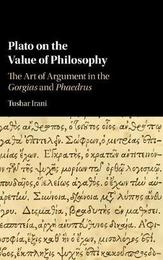
|
Plato on the Value of Philosophy: The Art of Argument in the Gorgias and Phaedrus
Hardback
Main Details
Description
Plato was the first philosopher in the western tradition to reflect systematically (and often critically) on rhetoric. In this book, Tushar Irani presents a comprehensive and innovative reading of the Gorgias and the Phaedrus, the only two Platonic dialogues to focus on what an 'art of argument' should look like, treating each of the texts individually, yet ultimately demonstrating how each can best be understood in light of the other. For Plato, the way in which we approach argument typically reveals something about our deeper desires and motivations, particularly with respect to other people, and so the key to understanding his views on the proper practice of argument lies in his understanding of human psychology. According to this reading, rhetoric done well is simply the practice of philosophy, the pursuit of which has far-reaching implications for how we should relate to others and how we ought to live.
Author Biography
Tushar Irani is Assistant Professor of Philosophy and the College of Letters at Wesleyan University, Connecticut.
Reviews'Beyond the substantial contribution it makes to the study of the Gorgias and the Phaedrus, Irani's book can serve just as well as a contemporary apologia of the love of wisdom based upon its social value. ... When a society - like that of Socrates' interlocutors, Callicles, for example - abandons, or simply loses interest in, the pursuit of wisdom, the inevitable consequence is a debasement of our interpersonal relations, especially as those relations are formed and sustained through rational discourse.' The Classical Review 'Irani is right that reading these two dialogues closely together has numerous benefits. Though other studies have pointed to comparisons between the two works, none has explored them so richly. ... it is a thought-provoking study, which is well-argued, informed by detailed discussion of texts, and which sustains the parallels between the two dialogues throughout. It contributes to discussions of the Gorgias, the Phaedrus, rhetoric, moral psychology and Platonic love, and I would recommend it to anyone with interests in these areas.' Notre Dame Philosophical Review
|